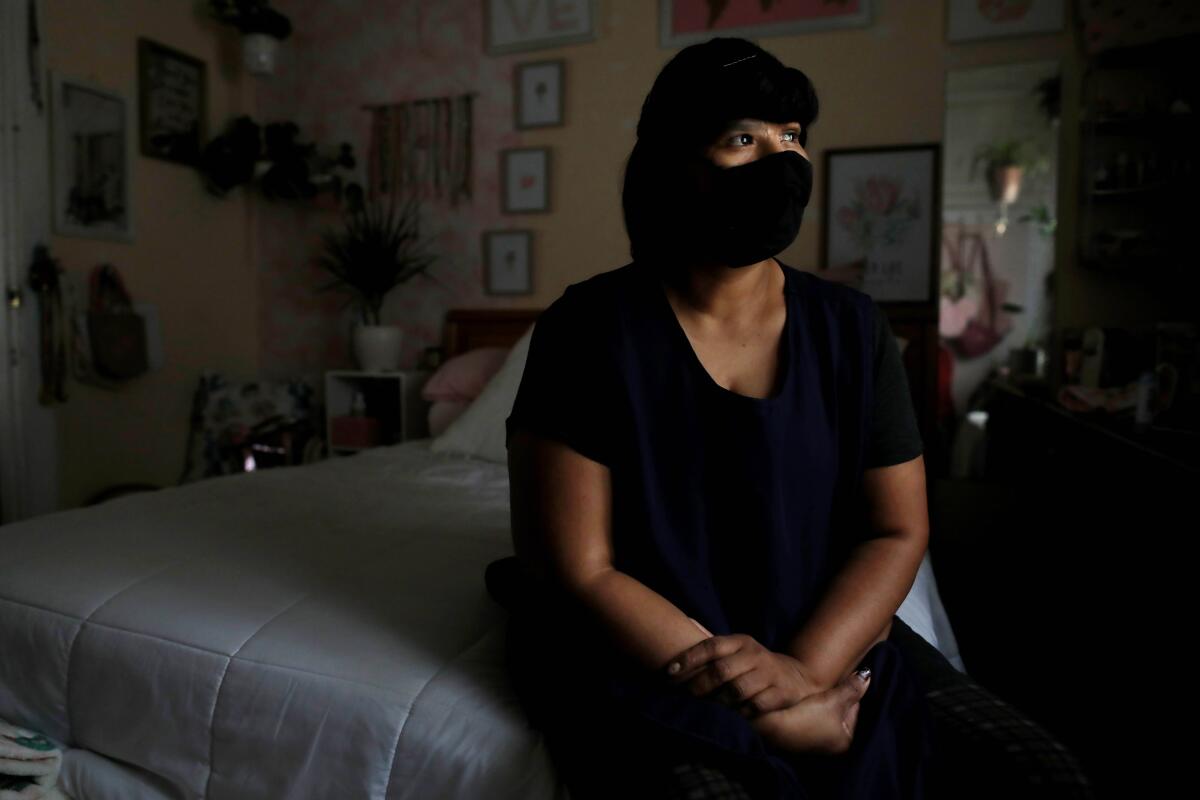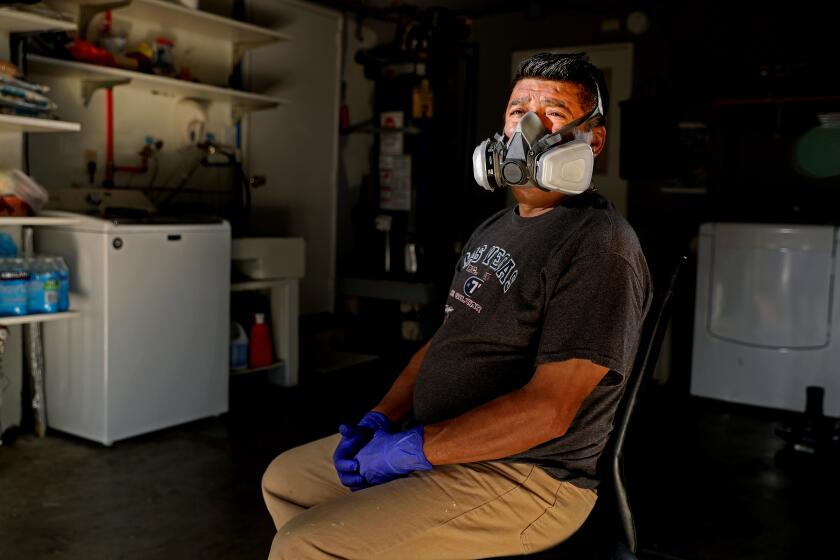She’s an essential worker, helping the homeless. But ICE plans to deport her next week

Many of the Vagabond Inn’s employees refused to return to work when the Ventura hotel reopened in mid-April to house the homeless during the COVID-19 pandemic. Unsure of the risks, many stayed home.
Victoria Galindo Lopez, a 48-year-old Mexican immigrant, was one of the few who stepped up and returned to her housekeeping job.
“I was needed,” she said in Spanish. “And I needed to work. I was happy to help the community.”
Galindo earns $13.15 an hour cleaning the hotel under the state’s Project Roomkey, which houses vulnerable homeless residents who don’t have symptoms of coronavirus but are at high risk of catching it. Although she’s happy to support her family and do her part to help combat the COVID-19 pandemic, she worries that her work may make her sick.
But despite performing essential work, she’s suddenly facing another imminent threat: deportation. Although Immigration and Customs Enforcement has allowed her to remain in the United States for nearly two decades for humanitarian reasons, the agency this year denied her application to renew her stay, without explanation.
“The truth is that this is so unjust,” Galindo said.
An immigration judge ordered her deported in 2005. But since 2011, ICE had refrained from deporting her based on “humanitarian reasons,” the specifics of which the agency refused to discuss. The immigration relief allowed Galindo to live and work in the U.S. legally. That all changed this year, and Galindo, a mother of four, is scheduled to be deported June 11.
“She has a stable home for these young four people. Now one kid may be dropping out of college and another kid is potentially dropping out of nursing school because of this,” said Galindo’s attorney, Vanessa Frank. “When you disrupt a family that is functional and make it dysfunctional, how is that helpful to anybody?”
ICE representative Alexx Pons said the agency couldn’t comment on specific cases “due to privacy concerns.”
On Monday, Frank filed a new stay request with ICE. She and her client have yet to hear back.
In hopes of preventing a surge of coronavirus cases in California’s homeless community, state officials launched Project Roomkey in April to move thousands of homeless people off the street and into isolation in hotel and motel rooms.
As of mid-May, the program has housed more than 7,900 people. the The project was implemented at a local level by way of partnerships with several counties that have large homeless populations, such as Los Angeles County. The Vagabond Inn in Ventura is servicing 150 rooms daily for the project. As of Wednesday afternoon, Ventura County had 1,190 COVID-19 cases and 35 people had died from the virus.
During coronavirus, Americans increasingly rely on migrant workers, many in the country illegally, who have no protections or financial support.
Galindo was 16 when she fled Mexico in 1988 for better work opportunities in the U.S. She entered the country without inspection and lived here without legal status until she and her husband hired a person to help them — believing that person was authorized to provide legal advice. They later realized he was a fake immigration attorney — better known among immigrants as a notario.
Galindo didn’t make the discovery until after an immigration judge ordered her deported in 2005 for fraudulently applying for asylum. Galindo said she and her then-husband did not have a valid asylum claim and weren’t aware that the notario had scammed them and submitted fraudulent paperwork.
In 2011, Immigration and Customs Enforcement officials raided her home but ended up not deporting her, on humanitarian grounds. Galindo has four children — all but one a U.S. citizen — no criminal record, a steady job and a mortgage. One of her daughters is protected from deportation and has a work permit under the Deferred Action for Childhood Arrivals.
Every year, she checked in with ICE officials. Every year, ICE renewed her stay of removal—until now.
In mid-May, Galindo received a letter that ICE had denied her latest petition. It didn’t say why, but it did tell her to report to ICE offices in Camarillo on June 11 with no more than 50 pounds of luggage.
Galindo is from the state of Guerrero in Mexico, where violent crime is widespread, according to the State Department.
She doesn’t know how to prepare for returning to a country she left so long ago.
“How do you prepare to die?” she said.
She says she doesn’t know what she’ll do if she’s ultimately deported. “I don’t even know what I will take with me other than the pants and shirt I have on me. The most important things to me I will be leaving behind — my children,” she said. “My whole life is here.”
During the time she was protected from deportation, Galindo had sought a separate form of immigration relief.
In 2018, she applied for a U visa, which is given to victims of serious crimes who provide a certification form signed by law enforcement stating that they have been or are likely to be helpful to an investigation. The visa is also available to the parents of underage crime victims who cooperate with law enforcement.
A few years ago, Galindo said, she discovered that her husband had sexually abused one of her daughters. She divorced him; he was arrested and ultimately deported, Frank said.
She applied for the U visa, adding her name to a backlog of applicants who are waiting several years to receive the immigration benefit. Galindo’s application is still pending but is expected to be approved in a year or two.
Deportation, however, would throw a wrench into the process, Frank said. She would have to wait up to 10 years in Mexico.
“It makes a huge difference in her ability to support her family,” Frank said.
During the pandemic, Galindo’s children have also become essential workers. Her two oldest daughters, who are early-childhood educators, are teaching and caring for the children of first responders and medical workers. Her youngest is graduating from high school and has helped distribute free meals during the pandemic.
“They wanted to get in there and help their community. And In turn they support one another. They are able to do amazing things because they have a family behind them to support them,” Frank said. “Why disrupt that?”
Before she goes to work at the Vagabond Inn, Galindo steels herself and tries not to think of the risk involved in cleaning up after strangers — some of the most vulnerable people in the county. She wears a mask, gloves and other protective gear when she tidies up the rooms, sweeps the bathroom floors and changes the linens. That gear makes her feel somewhat protected, but she worries about falling ill.
“My workmates and I talk about it a lot, but we also have rent and bills to pay,” Galindo said. “We’re scared.”
Ruben Montiel, general manager of the Vagabond Inn, wouldn’t comment for this story but wrote a letter about Galindo that was included in her attorney’s appeal to immigration officials.
Montiel described Galindo as a “hardworking employee” who “gives every guest excellent service.”
“She does her work with pride. She knows that her work is making a difference for the community,” Montiel wrote. “She’s an invaluable part of my team and I know there are not many like her.”
The administration refuses to release migrant kids to ready sponsors, telling courts that custody is safer — even as it ramps up deportation efforts.
Galindo’s eldest daughter is upset and confused about her mother’s deportation.
“I don’t understand why they are taking her now when she is saying, ‘Hey, I’m still here and working hard. I’m not running away. I have no criminal record. I’ve shown up to every appointment on time. I have a Social Security number and paid taxes,’” the 28-year-old U.S. citizen said.
She said she wasn’t emotionally ready to let her mother go. She worries about her mother’s safety if she’s deported to Mexico.
“We’ve had a mom here for our whole life. Her not being here? It’s going be like big hole in our lives,” she said. “We work as a team.”
As she mourns her mother’s possible exile, she also feels immense pressure about the logistics of heading a household.
She asks herself: “Should I get a second job?” “How am I going to help my siblings?” “If she leaves in less than a month … it’s so little time. What do we do?”
More to Read
Sign up for Essential California
The most important California stories and recommendations in your inbox every morning.
You may occasionally receive promotional content from the Los Angeles Times.













